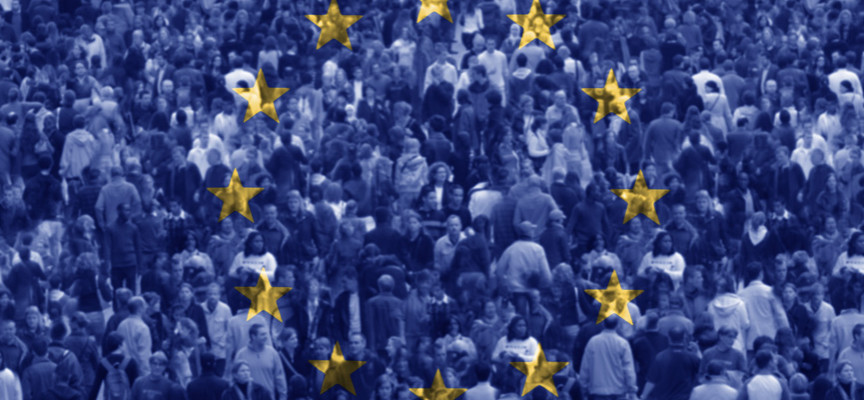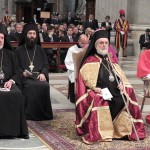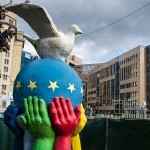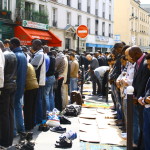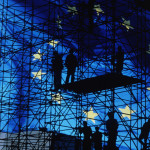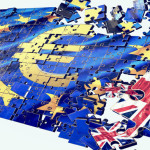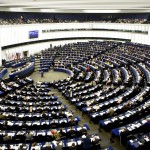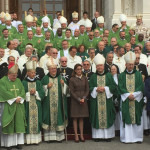“Europe is not a superstate nor a sophisticated technocracy, but a coexistence of diversities, able to make them work together and integrate them within the horizon of the meaning of a personalistic humanism”: it was reaffirmed by Cardinal Angelo Scola, Archbishop of Milan, on December 7th on the occasion of St Ambrogio’s celebrations.
The words seem to echo Robert Schuman’s ones, who dedicated his life to the construction of Europe: “This set of states cannot and must not remain an economic and technical enterprise: it needs a soul, a conscience of its historical similarities and of its present and future responsibilities, of a political will to serve man “.
Today, Europe is dying because it is stuck in an ultra-liberal economy and a wild finance; its politics is limited to partisan selfishness. It is stifling Europe’s vocation to be “the most valuable part of the universe, the pearl of the planet, the intelligence of a large body “.
Europe appears deprived of a soul that allows it to be master of its own destiny; its heart, capable in history of building cathedrals whose spiers pointed the minds of its inhabitants to the sky, is now blocked by an exorbitant well-being in the hands of a few. Its role, which was to bring together peoples separated by hatred centuries old, is now dissolved in the construction of walls and barriers, place of hostility, of rivalry, of fences. And ‘wound on one side by the terroristic violence and weakened on the other by xenophobia if not by racism. Why all this happened? According to Archbishop Scola in conscience has failed the value of man understood as a person in its whole.
The crisis of Europe is therefore above all a crisis affecting the man who thinks and loves and is able to be moved, the man who lives in a solidary relationship with others, the man who evaluates reality and is measured by his consciousness, the man who looks at what transcends it while at the same time lives his every day life on the streets of men, his peers. The archbishop invites “to recall the founding values, declined with new ways respect to the difficult times we live in”. In his speech “to the city”, the cardinal highlights four challenges that Europe must face: the wave of immigration, terrorism, the financial crisis and the political one.
“To the wave of migration – he says – is being responded with a relative approach, and in no particular order.” The financial crisis is affecting the entire continent, though not all the nations in the same way, “which complicates the problem.”
Finally he dedicates a thought to the politics that “is experiencing a historical crisis as to its reason for being,” which “cannot have its only criterion of action in the immediate approval “, and that should not be limited “to the pure exercise of power” .
It’s a echo of Pope Francis’ words on the 24th October 2016 to the delegates of the 36th General Congregation of the Jesuits: “I believe that politics in general, the great politics, is increasingly degraded in small politics … we lack those politicians who were capable of seriously putting themselves at stake for their ideals, who were afraid neither of dialogue nor of fight, but went on with intelligence and with the charism proper to politics. Politics is one of the highest forms of charity. The great politics. And I believe that biases do not help: what helps in politics, instead, is dialogue”.
“L’Europa non è un superstato né una raffinata tecnocrazia, ma una convivenza delle diversità, capace di farle collaborare e d’integrarle nell’orizzonte del senso proprio di un umanesimo personalista”: lo ha ribadito il 7 dicembre il cardinale Angelo Scola, arcivescovo di Milano, in occasione della festa di Sant’Ambrogio.
Le parole sembrano riecheggiare quelle di Robert Schuman, che dedicò la vita alla costruzione dell’Europa: “Questo insieme di Stati non potrà e non dovrà restare un’impresa economica e tecnica: ha bisogno di un’anima, di una coscienza delle sue somiglianze storiche e delle sue responsabilità presenti e future, di una volontà politica al servizio dell’uomo”.
L’Europa oggi agonizza perché si è impantanata in un’economia ultra-liberale e in una finanza selvaggia; una politica ristretta agli egoismi di parte. Sta soffocando la vocazione dell’Europa di essere “la più preziosa parte dell’universo, la perla del pianeta, l’intelligenza di un grande corpo”.
L’Europa appare privata di un’anima che le permetta di essere padrona del proprio destino; il suo cuore, capace nella storia di costruire cattedrali le cui guglie orientarono verso il cielo le menti dei suoi abitanti, è ora ostruito da un esorbitante benessere in mano a pochi. Il suo ruolo, che era quello di riavvicinare i popoli separati dall’odio secolare, si è oggi dissolto sotto la costruzione di muri e di barriere, luogo di ostilità, di rivalità, di steccati. È ferita da una parte dalla violenza terrorista e indebolita dall’altra dalla xenofobia se non dal razzismo. Perché tutto questo è avvenuto? Secondo l’arcivescovo Scola è venuto a mancare nella coscienza il valore dell’uomo inteso come persona nella sua integralità.
La crisi dell’Europa è quindi anzitutto una crisi che investe l’uomo che pensa, che ama ed è capace di commuoversi, l’uomo che vive in relazione solidale con gli altri, l’uomo che misura la realtà ed è misurato dalla propria coscienza, l’uomo che guarda a ciò che lo trascende e contemporaneamente vive la sua storia di ogni giorno sulle strade degli uomini, suoi simili. L’arcivescovo invita “a recuperare i valori fondativi, declinati con modalità nuove rispetto ai tempi difficili che viviamo”, Nel suo “discorso alla città”, il cardinale mette in evidenza quattro sfide che l’Europa deve affrontare: l’ondata migratoria, il terrorismo, la crisi finanziaria e quella politica.
“All’ondata migratoria – afferma – si sta rispondendo con un approccio relativo e in ordine sparso”. La crisi finanziaria colpisce tutto il continente, anche se non nello stesso modo tutti gli Stati, “cosa che complica il problema”.
Dedica infine un pensiero alla politica che “sta vivendo una crisi storica quanto alla sua ragione d’essere”, che “non può avere nel consenso immediato l’unico criterio di azione” e che non si deve limitare “alla pura gestione del potere”.
Riecheggiano le parole di papa Francesco, che il 24 ottobre 2016 ai delegati della 36ª congregazione generale dei gesuiti, disse: “Credo che la politica in generale, la grande politica, si sia sempre più degradata nella piccola politica…mancano quei politici che erano capaci di mettersi sul serio in gioco per i loro ideali, che non temevano né il dialogo né la lotta, ma andavano avanti con intelligenza e con il carisma proprio della politica. La politica è una delle forme più alte della carità. La grande politica. E su questo credo che le polarizzazioni non aiutino: invece ciò che aiuta, nella politica, è il dialogo”.
Edoardo Zin
Latest posts by Edoardo Zin (see all)
- 60° Treaties of Rome: a Europe that struggles and hopes - 19 marzo 2017
- Europe lacks the great politics - 28 dicembre 2016
- The strength of Robert Schuman - 30 aprile 2016

